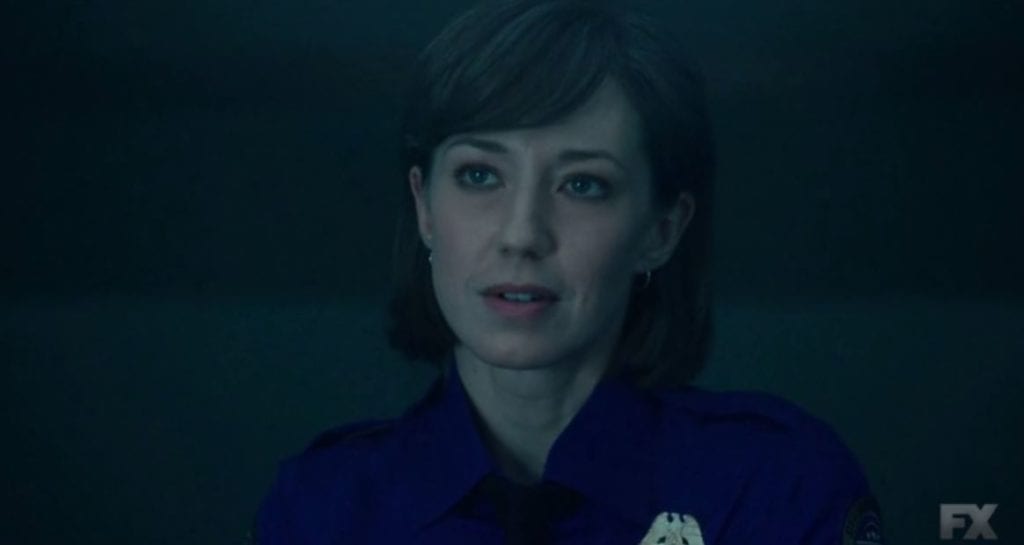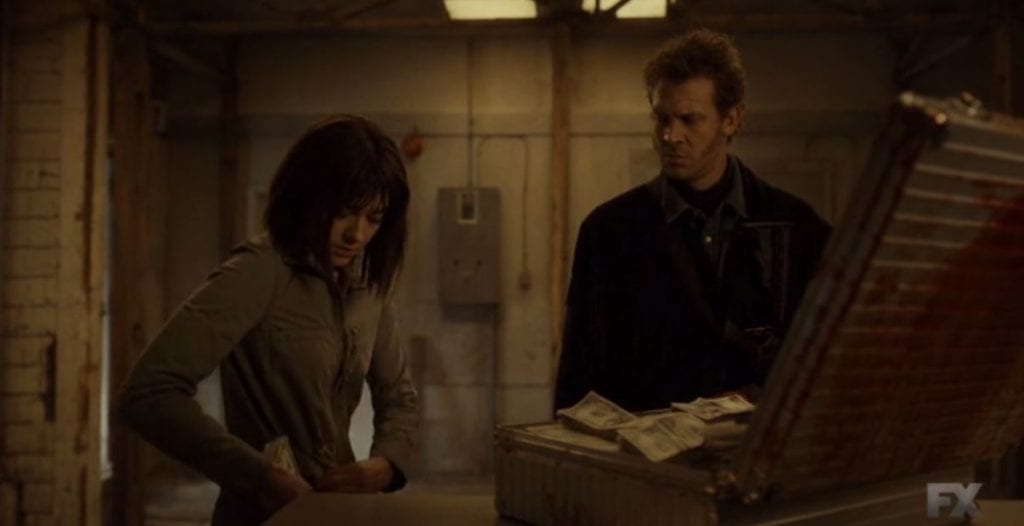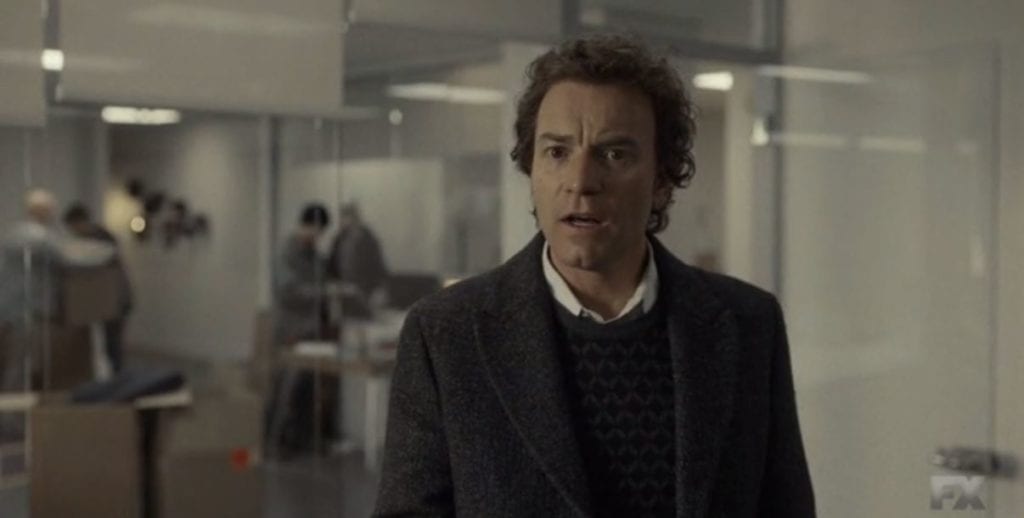Fargo has ended its third season, and with it a spring TV season unlike any I’ve possibly ever seen. The number of remarkable shows to air over the past few months has truly shown a golden age of TV. Against this vast amount of high quality competition, Fargo’s third season already felt lesser. Unfortunately, the finale not only left it far short of the rest of these shows, but far below the incredible two seasons preceding it. More than anything I find myself walking away thinking “so what?” to the entire season.
Spoilers for 3×10 “Somebody to Love” and the entirety of season 3 below

Episode Review
Fargo’s finale actually started off well and gave me hope of deliverance on the various things built up throughout the season. Glimpses of Fargo’s previous quality showed in the first 20 minutes as the Nikki/Varga war came to its head and Gloria received the call from the IRS agent. The episode seemed poised to deliver a strong ending.
Then it just…stopped. I found myself unable to care in the slightest as Fargo began checking off the boxes for each character in the most uninteresting ways imaginable.
Turns out Goldfarb used Varga to take over Emmit’s company and…she just does. Nothing comes of her one brief appearance, nothing about it matters, and Emmit learns the extent of the scheme before the plot is unceremoniously dropped. The IRS agent explains how Varga and Goldfarb took over the company and it literally has no bearing on anything which happens afterwards. Nikki confronts Emmit in the middle of nowhere and ends up shot by a cop. Wrench kills Emmit after a five-year time skip that all but says “screw you” to anyone who thought the things currently happening mattered.
An ending confrontation between Gloria and Varga shows Gloria working for the Department of Homeland Security (why?). They have the same conversation shown at least two or three times. What was the point of this? To let you decide whether Gloria was right and Varga would be arrested, or Varga was right and he would walk free? How was this the ending of the season? These two weren’t rivals. It didn’t resolve anything or have any bearing on the rest of the season.
At best it reinforced a “life is shit; get used to it” thing Fargo apparently decided was the point of Varga’s character.
There was simply no satisfaction in the way any character ended this episode. And that would be fine if I had a reason to care. I’ve consumed plenty of brilliant stories that failed to satisfy the way, say, Black Sails did. Sometimes life IS shit and the bad guys win. The problem arises when you give me no reason to care about any of the people suffering. Why should I care if Varga goes free? He was an awful villain. Why should I care if Gloria is right? She received little chance to shine this season. Why should I care about Varga’s goons being massacred by Wrench? I like Wrench, but we didn’t even get to see it and the goons were completely uninteresting.
The only truly strong reaction I had to anything in this episode was Nikki’s death, and that reaction was anger at the stupidity of the entire situation. Nikki Swango was shown all season to be a woman of composure and plans who stays calm in the face of extreme danger. Now suddenly she’s so unsubtle and panicky that she can’t compose herself in front of a cop asking for a license? She can’t see any other way to handle this than grabbing a gun and shooting at the cop? Now she suddenly feels the need to delay rather than kill Emmit?
If this scene was in a vacuum, perhaps I could rationalize her behavior as Nikki at her breaking point, more caring about killing Emmit than maintaining her typical composure. This did not happen in a vacuum, as the episode was full of idiot ball moments like this. Varga and his men walk stupidly into Wrench and Nikki’s trap. Nikki and Wrench just walk away because Varga climbed out of an elevator. Emmit’s car randomly starts up again after Nikki and the cop kill each other, and he doesn’t grab his license back from the cop, yet somehow no one knows he was there? Why would Wrench hunt Emmit down 5 years later to kill him?
There were enough plot holes in this episode to match your average Game of Thrones finale, and Fargo didn’t even have the pretty visuals to distract anyone.
“Somebody to Love” was a disappointing end to a disappointing season.

Season Review
So much about the season’s quality rode on this finale. I’ve had my problems all season, but nothing that couldn’t be solved with a strong finale. Instead we got this, which not only confirmed the weakness of the season but made it even weaker.
There was very little resolution to anything brought up this season. Which, again, if done properly can be fine. So long as you take care to conclude the characters and themes of the season, the unresolved plots can be excused. Fargo didn’t do that, and so I’m left to look back on the entire season and wonder what the point of 90% of it was. Even worse, elements of the plot which could have been salvaged or retroactively improved by the finale were confirmed as plain bad and pointless.
Turns out Gloria’s boss was really nothing more than an awful plot device. Turns out Gloria’s grandfather didn’t matter at all. Varga really was that uninteresting, rather than a fraud conning Emmit or a powerful boss with a greater plan. Sy’s season-long torture was just pointless torture to make you feel bad.
Things felt so sloppy all season, and culminated with the sloppiest writing yet in the finale. I understand what Fargo was going for. Noah Hawley wanted to play with the series tagline of Fargo’s “true stories” by examining the idea of true stories as a concept. The problem is he never went beyond playing with the idea. It would come up from time to time, but rarely with any real connection to the season’s events.
Yeah, it’s nice that the opening scene in Germany and the final scene with Gloria and Varga paralleled. This wasn’t a consistent theme in the least, though, so the effect falls flat and leaves you feeling unsatisfied.
Unfortunately, it appears much of the debate will focus on the ambiguity of this ending and whether it works or not. I’ve already seen the defenses about the very Coen-ish feel of it, and how people who don’t like it just can’t handle the ambiguity. This isn’t the problem, though. An ambiguous ending works just fine if the events preceding it satisfy. Take the Coen classic No Country for Old Men. While many a disgruntled viewer didn’t like the ending, the preceding events were brilliant and resolved everything that needed to be resolved. The questions, characters, and themes of the episode were handled terrifically, and the ending reinforced them all.
Fargo’s second season did much the same. The ending for Hanzee and the Blumquists did not satisfy everyone, but by that point everything that mattered was handled. The preceding events were so good that the ending didn’t need to be perfect. More importantly, the ending reinforced themes consistent throughout the season.

All I’m left with at the end of this third season is a bad taste in my mouth. What was this season ultimately about? Alternative facts? I see enough of that every day in the news, and Fargo did nothing particularly clever or interesting with it. Am I supposed to walk away disgusted with life or the rich? Because that kind of nihilism is all too present on TV anymore and again, Fargo did nothing clever or interesting.
It’s a shame because this was not a bad season. Fargo remains a good drama. The cast elevated their characters, the cinematography remained strong, and the creativity throughout the season easily met Hawley’s high standard. Many strong elements existed throughout but none of them ever came together well. The rare times those elements did come together, we received some fantastic episodes.
Ultimately, though, it all just felt pointless and hollow. The characters never felt interesting beyond whatever life the actors managed to breathe into them, which was considerable at times but never quite enough over the long haul. The story never really had a point. Maybe this was Hawley’s intention, but I don’t buy it.
You don’t play the classic Fargo music while showing Nikki’s dead body unless you want me to interpret her death as something tragic. You don’t show Sy breaking down in his wife’s arms unless you’re trying to prove a point about the torture driving him to break down. I ask what this point ultimately was and I can’t fathom anything beyond “life is random and awful”. I don’t believe Hawley was trying to make any larger point about caricatures or the awfulness of these characters when there were clear moments where I was supposed to care.
Not only did this feeling fail entirely for me, but the awfulness is such an antithesis of Fargo’s core ideas. I’ve talked in previous reviews about the heart so important to Fargo. Terrible crimes always happen, but you follow good people with good intentions who balance the awfulness and absurdity of the crimes. Life may be bad and people may suffer, but you still see good people rewarded for being good, and sense is made of things.
Lorne Malvo was awful and did awful things in Fargo’s first season. He tortured people just as badly as Varga tortured Sy. The difference was the execution. The characters mattered. His crimes felt severe. Lester was a terrible man, but his actions held weight. Opposite of them I had an amazing cop character in Molly Solverson chasing them. She didn’t fully succeed, but that was okay. Along the way she completed a satisfying character journey. I had reason to care about her. I had reason to care about the Blumquists in season 2, despite their crimes.
If all that’s left is boring characters navigating pointless awfulness, why in the hell should I care? That’s the biggest flaw of this disappointing season. In the end I really had no reason to care about anything that happened. Off all the things I expected to feel when Fargo’s third season ended, complete indifference was not among them.

